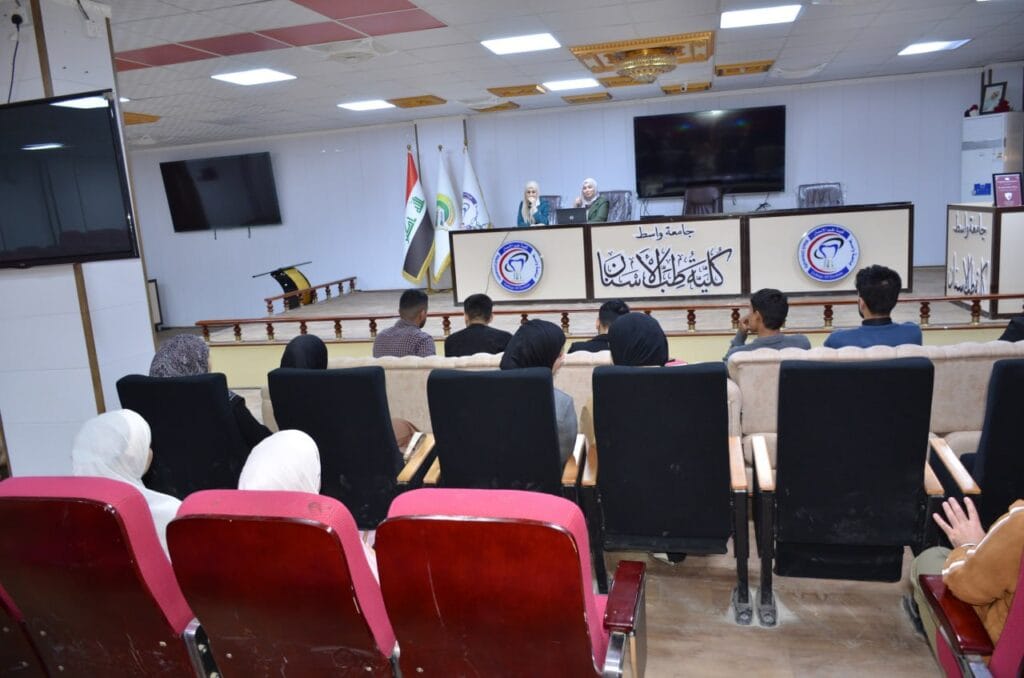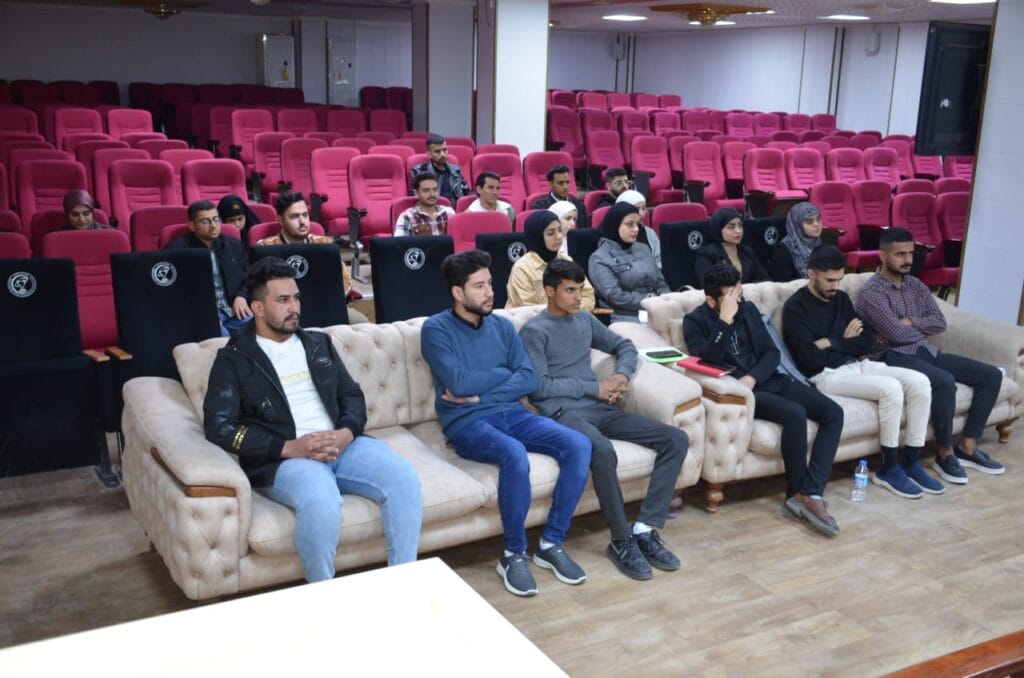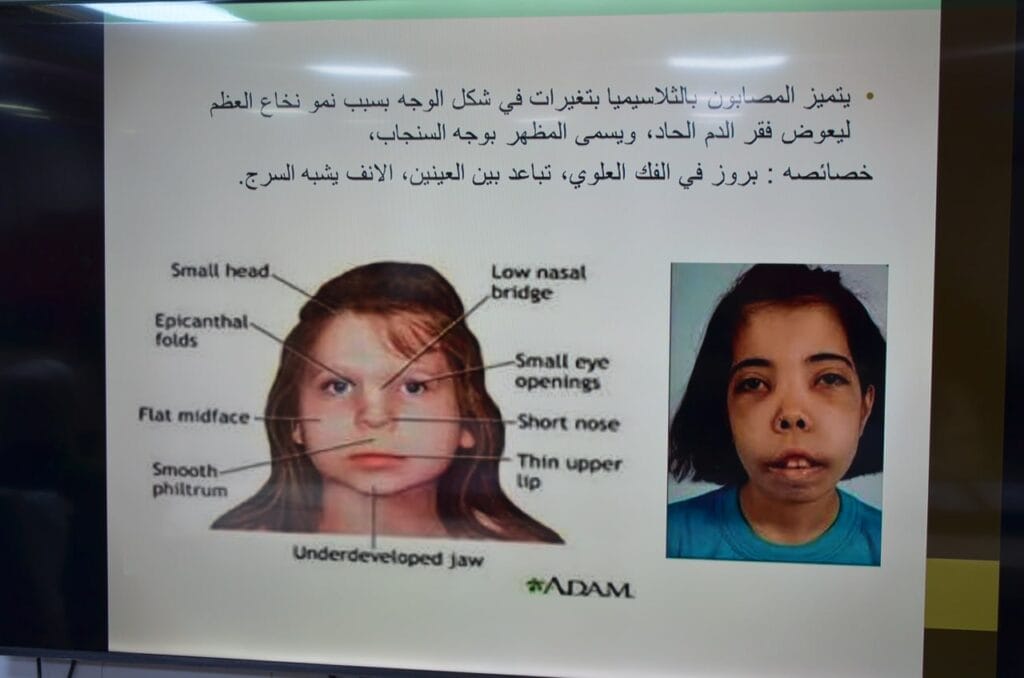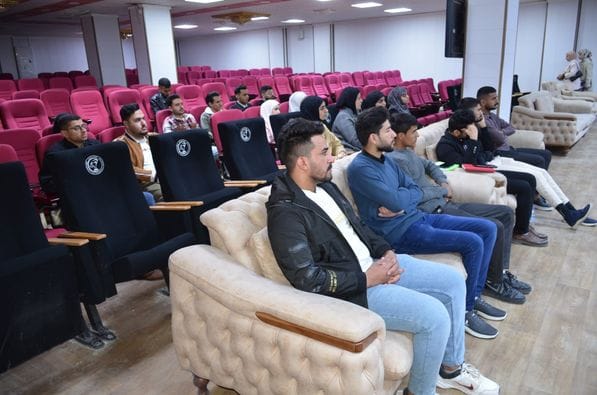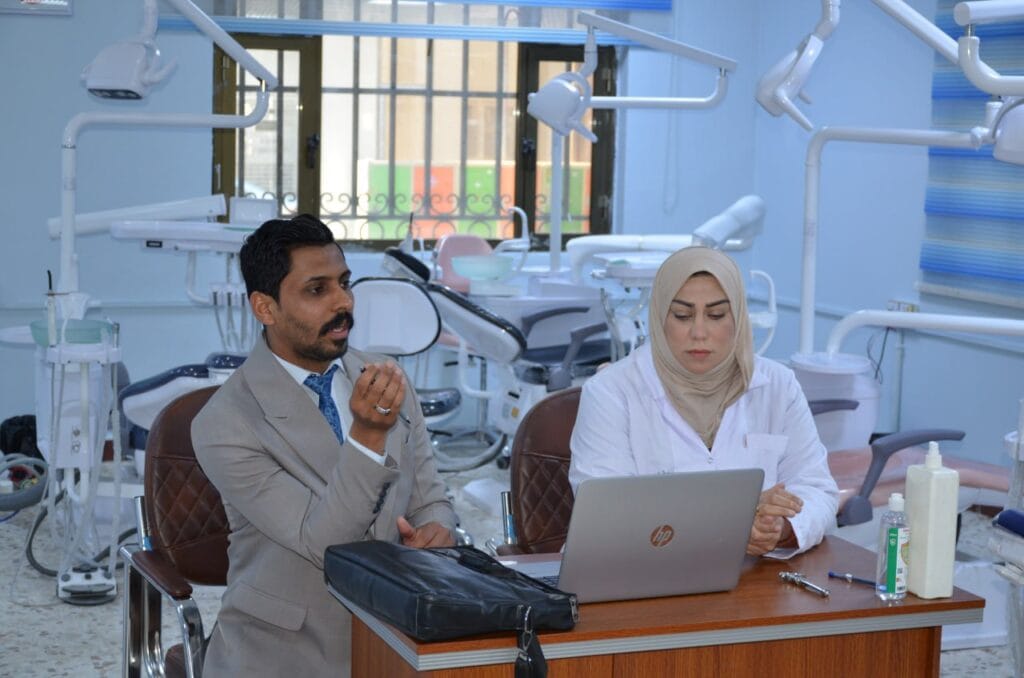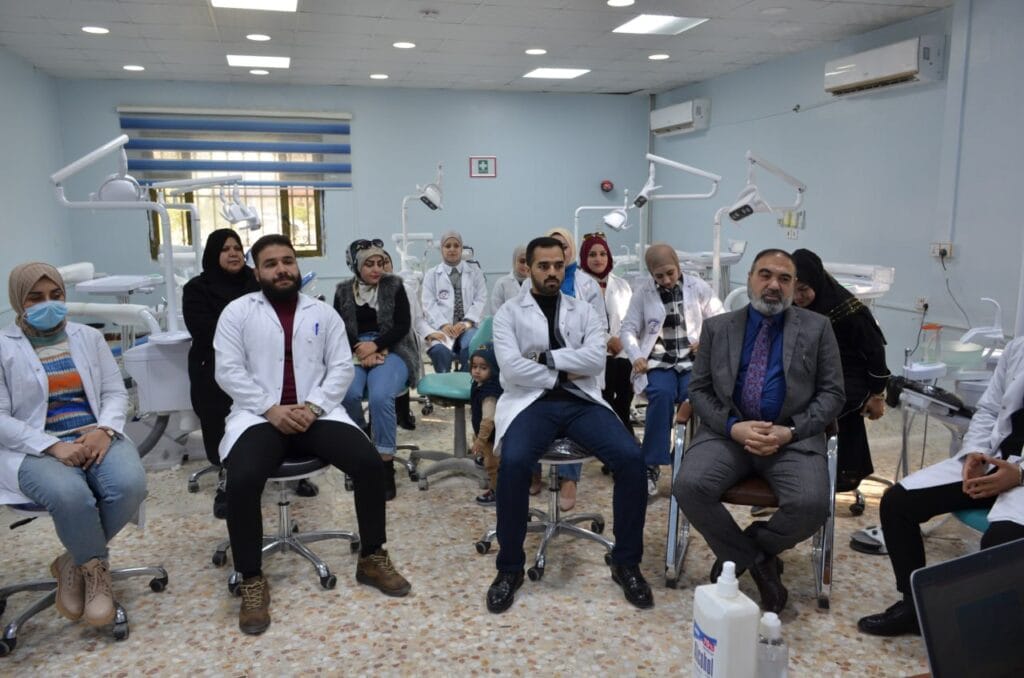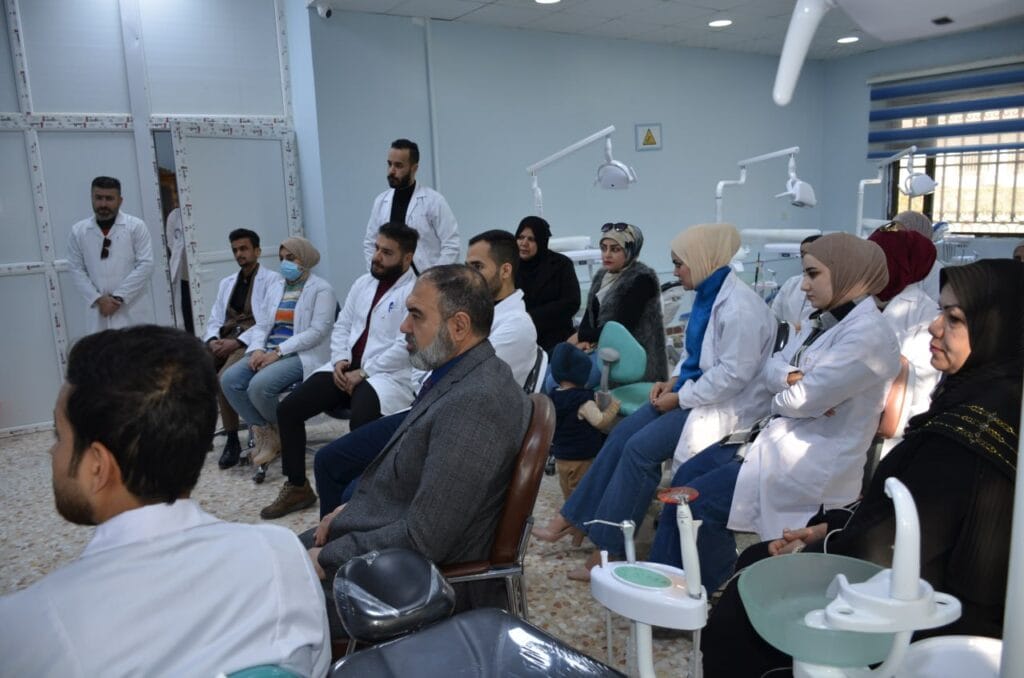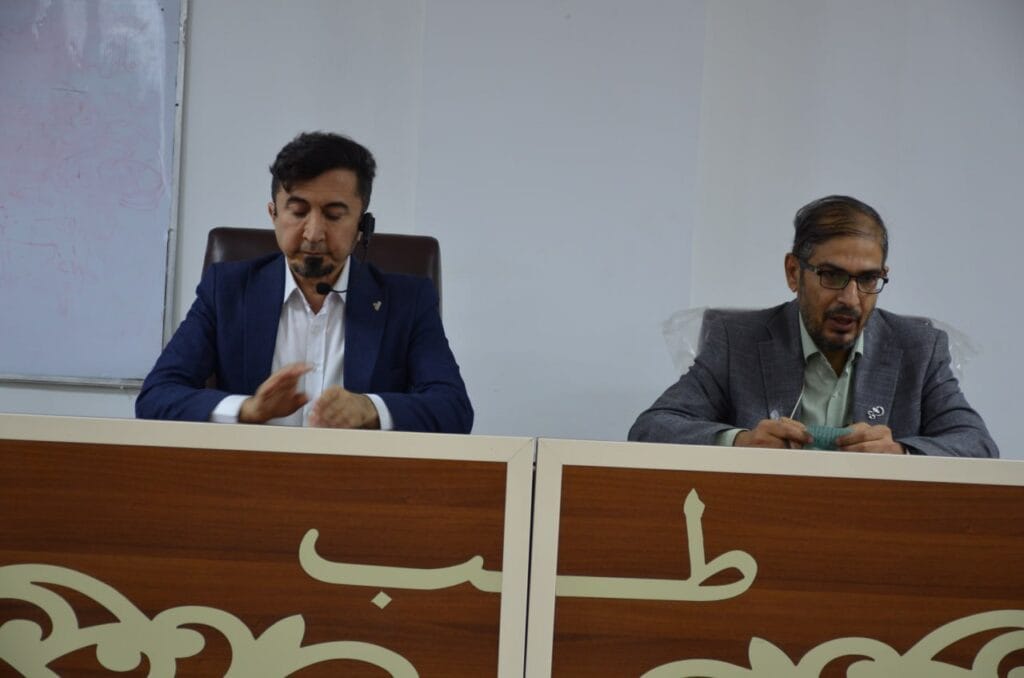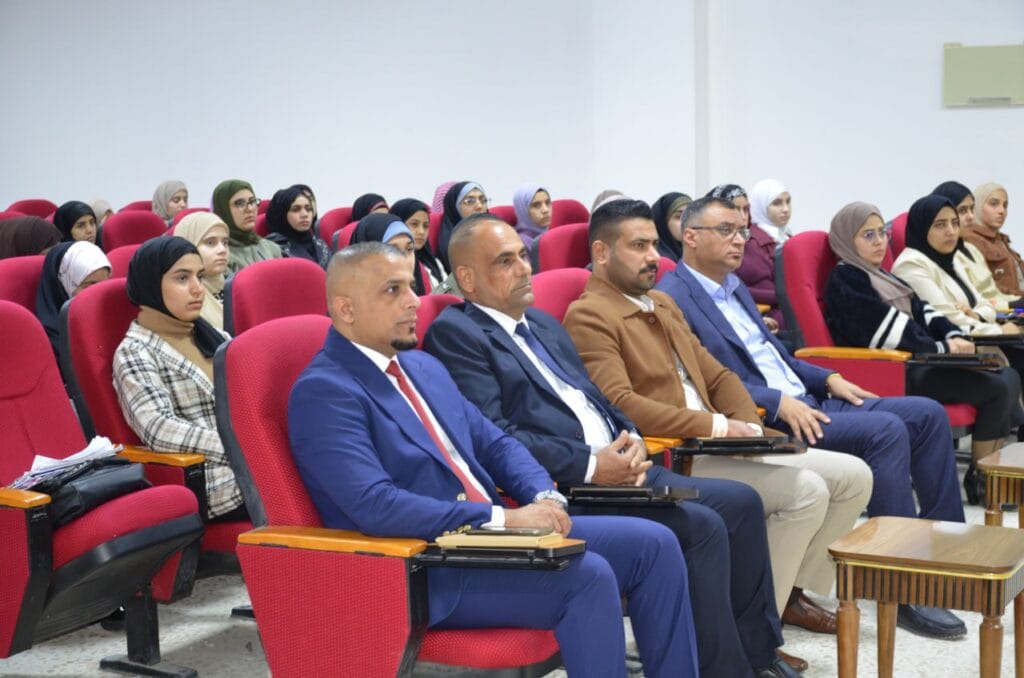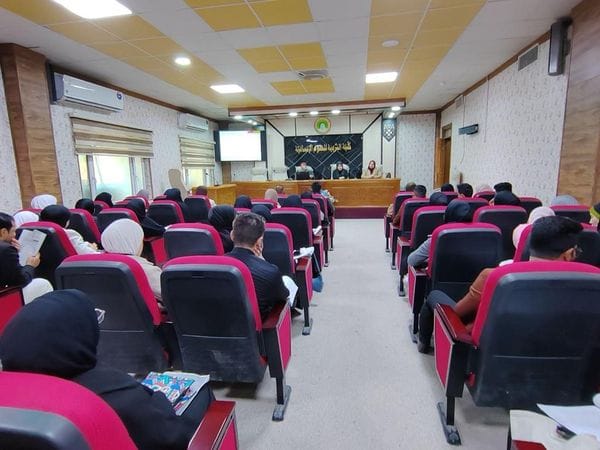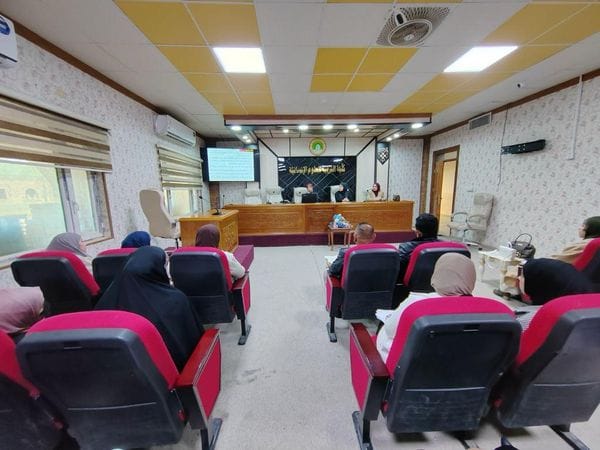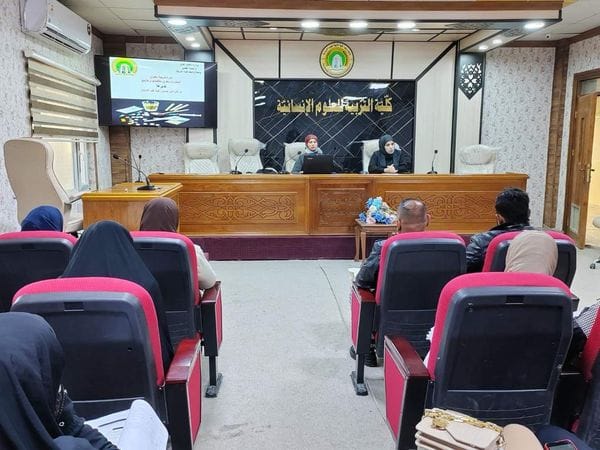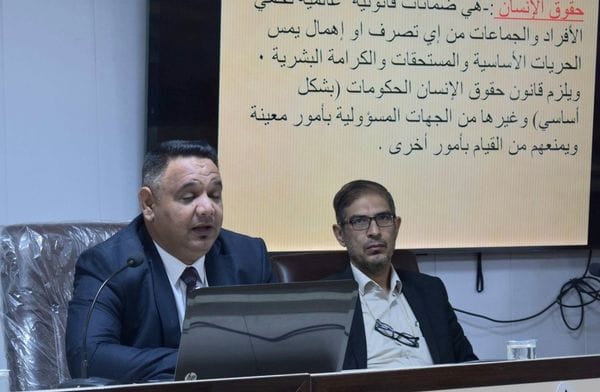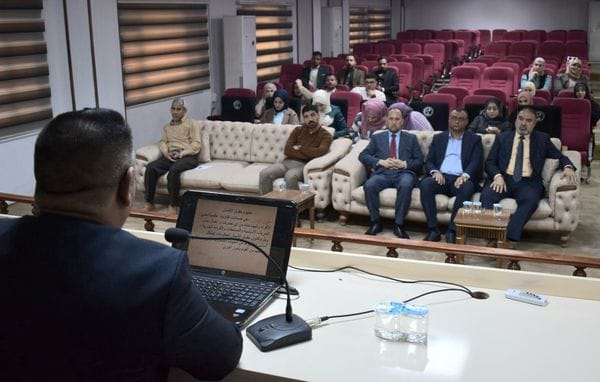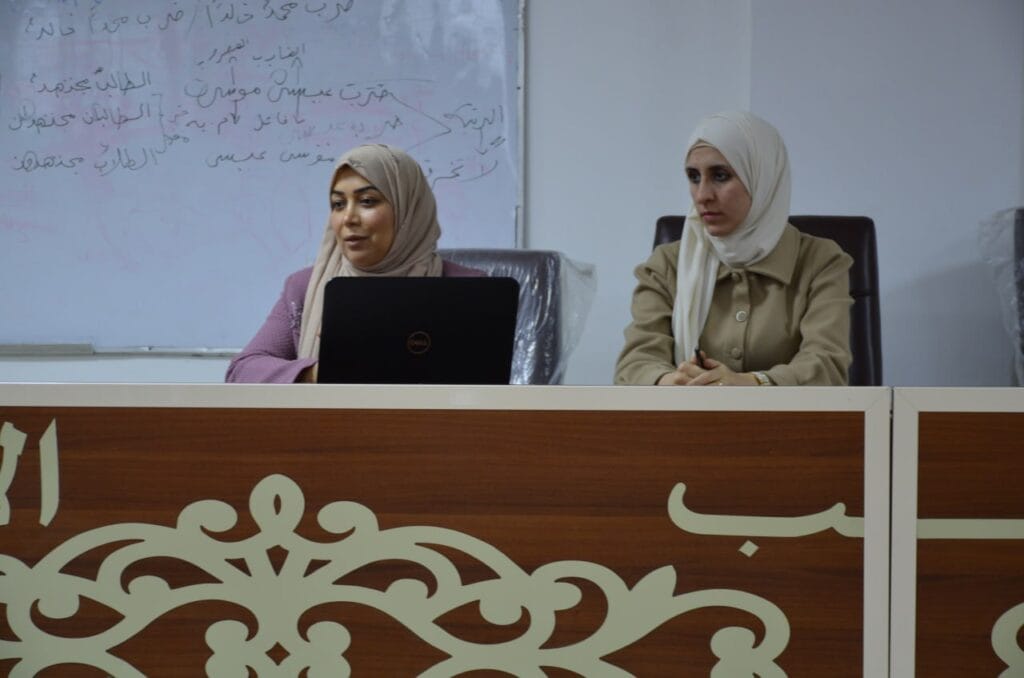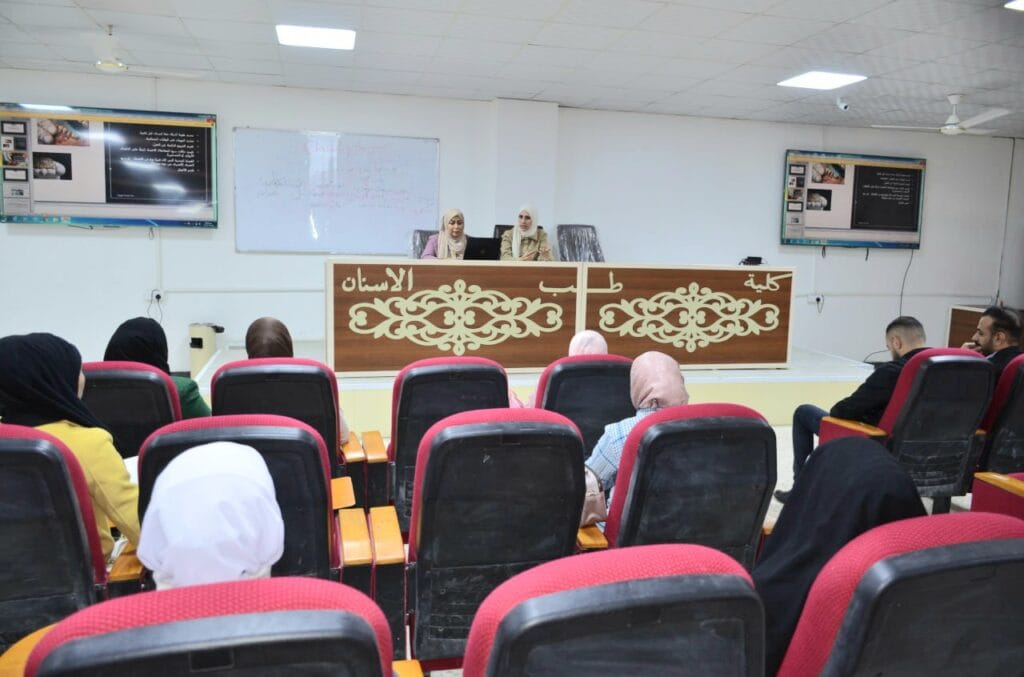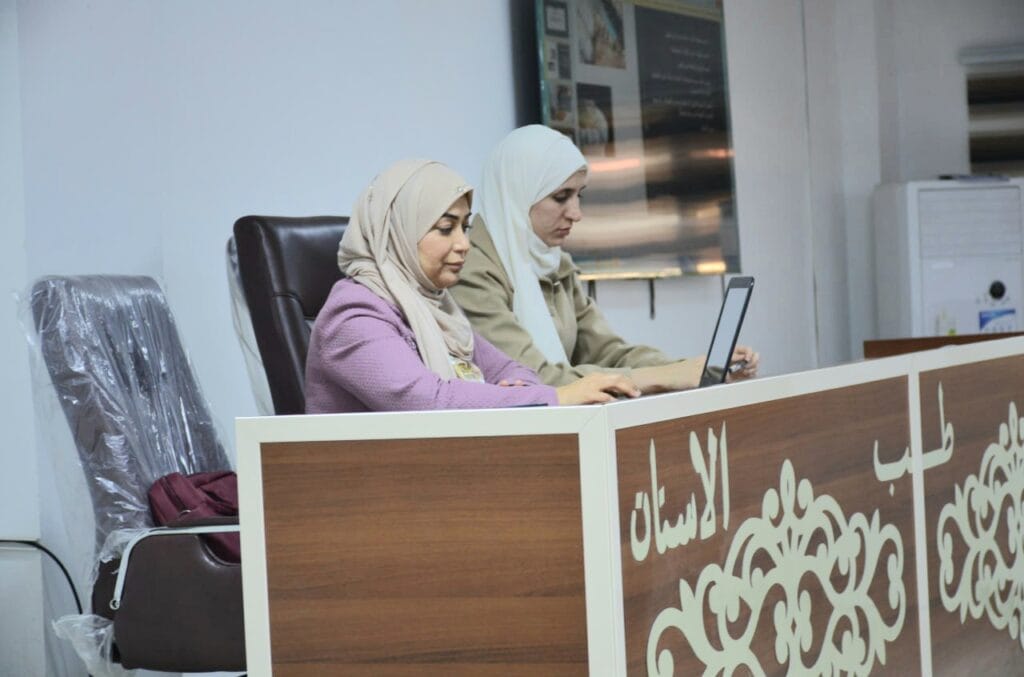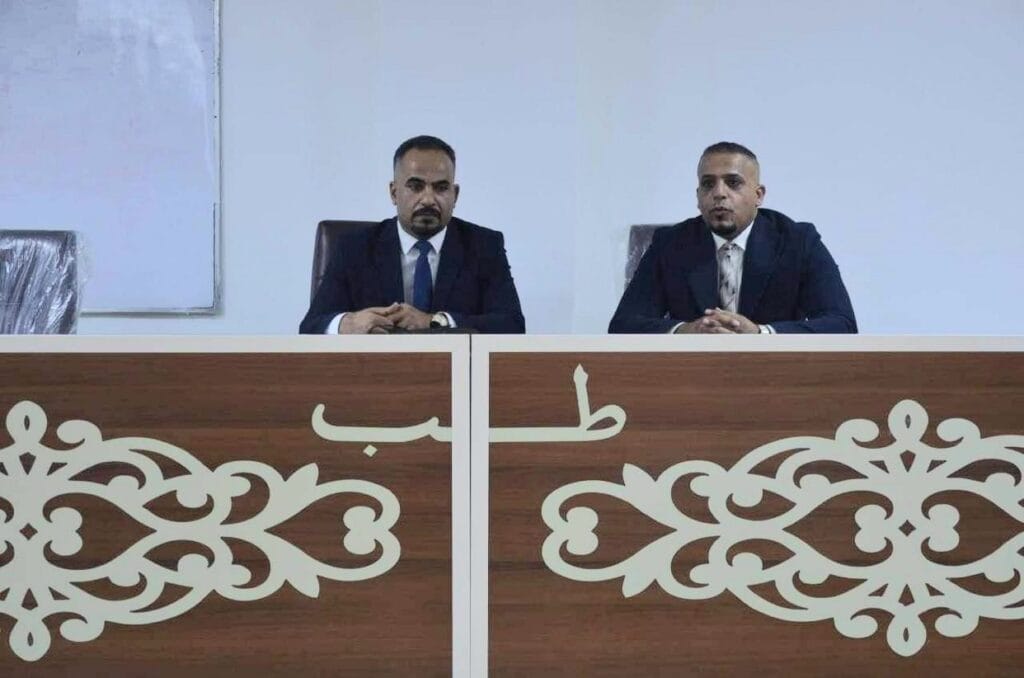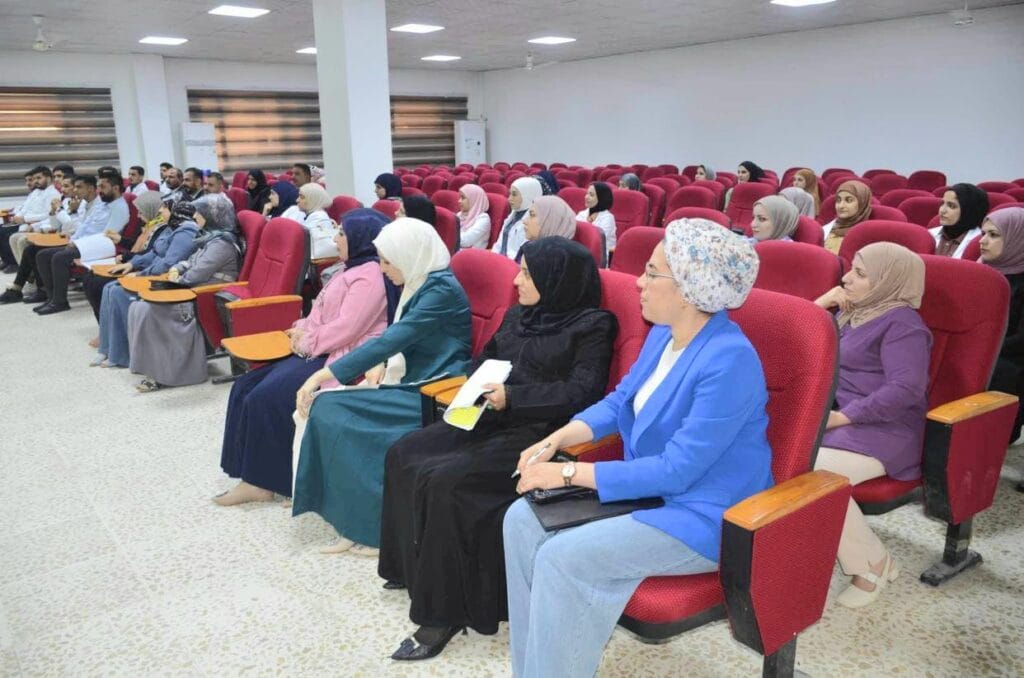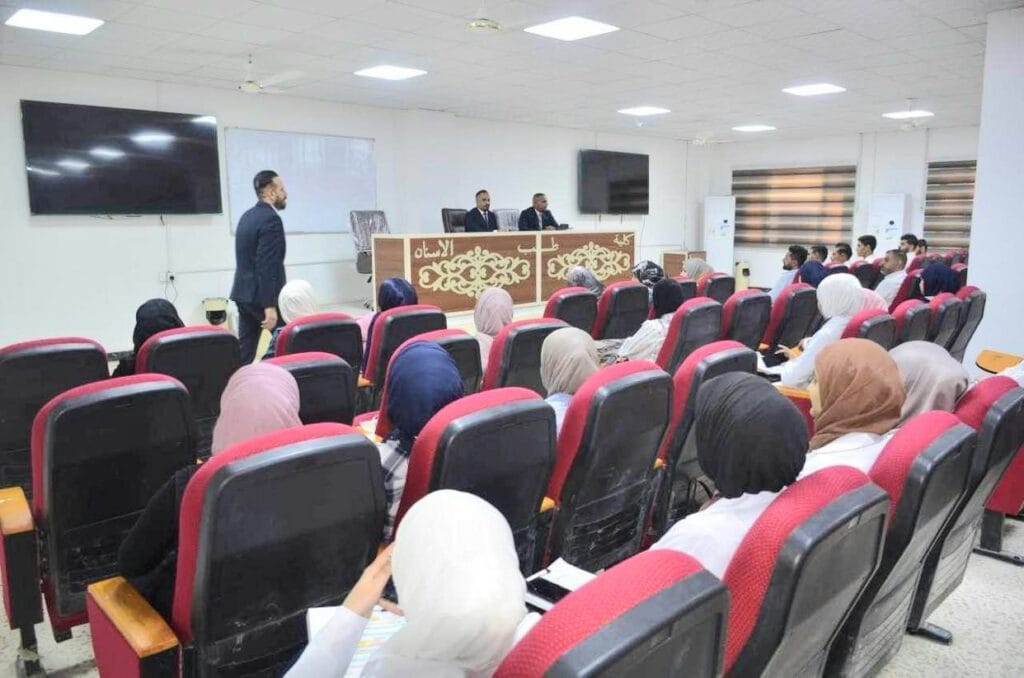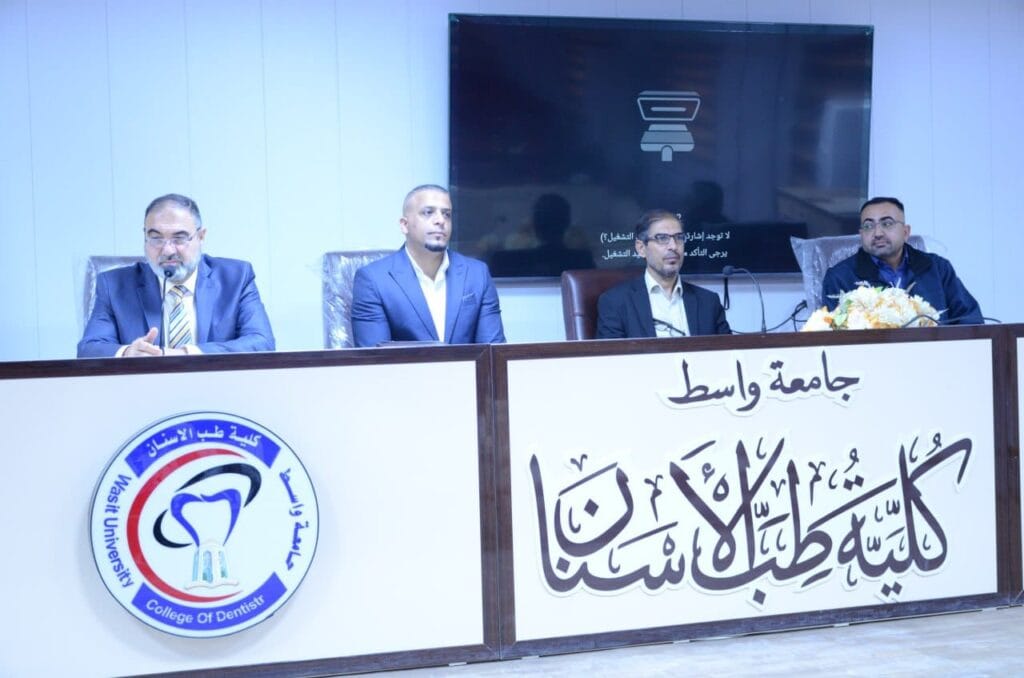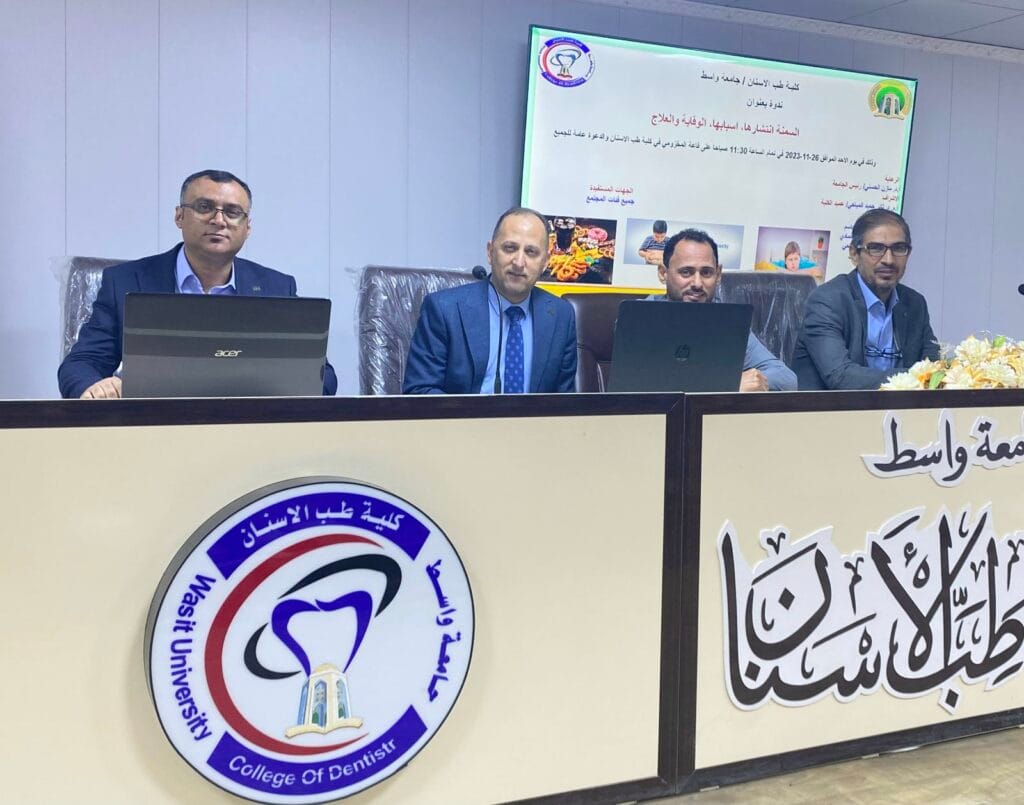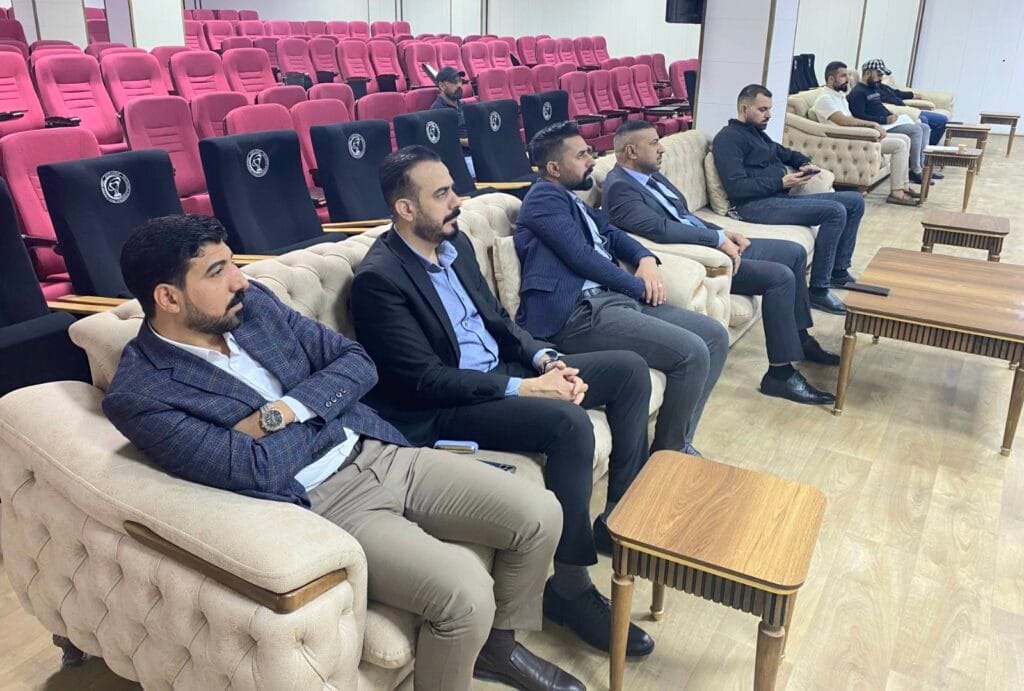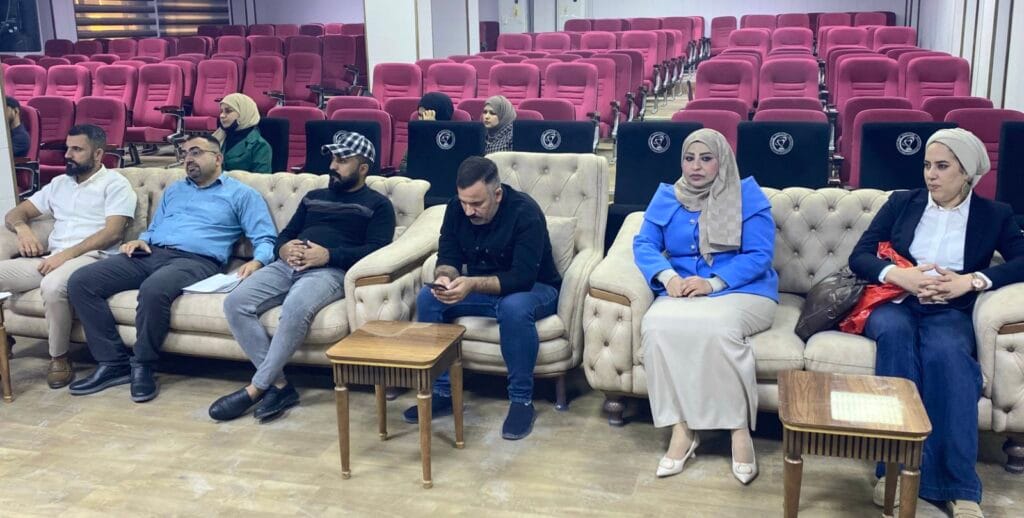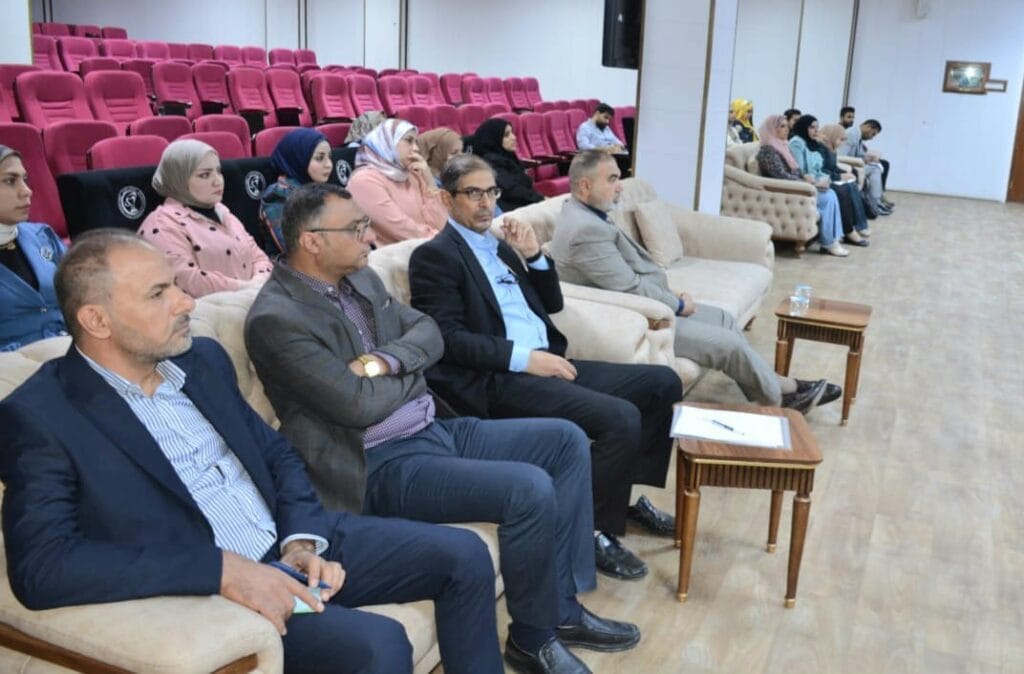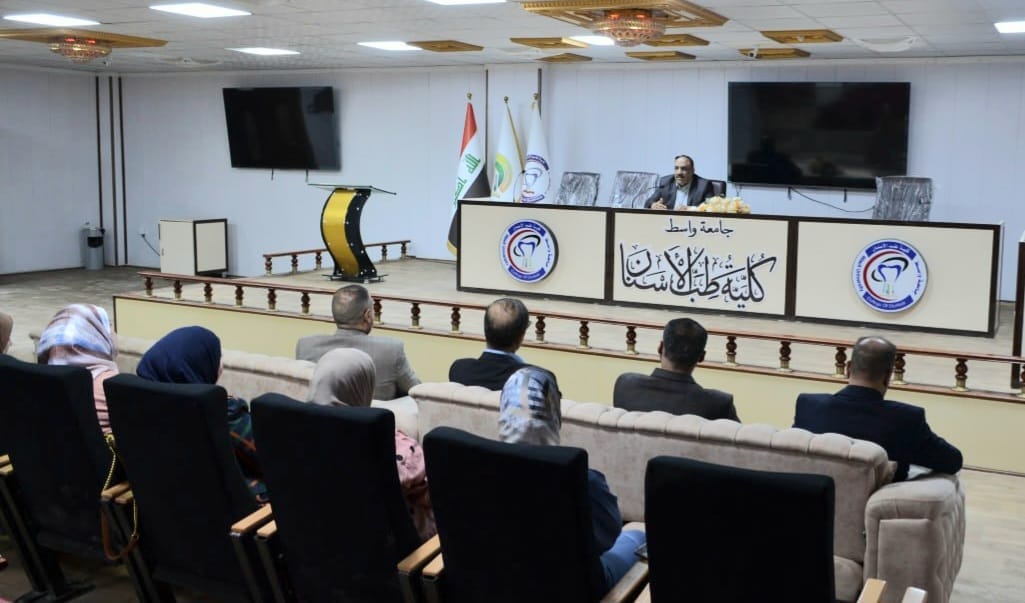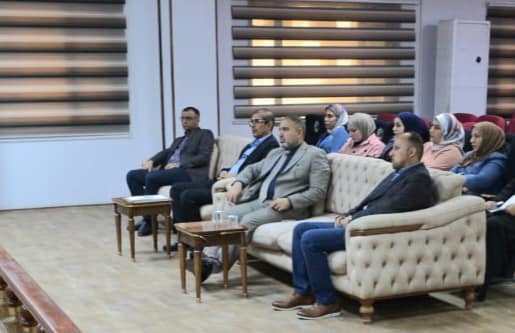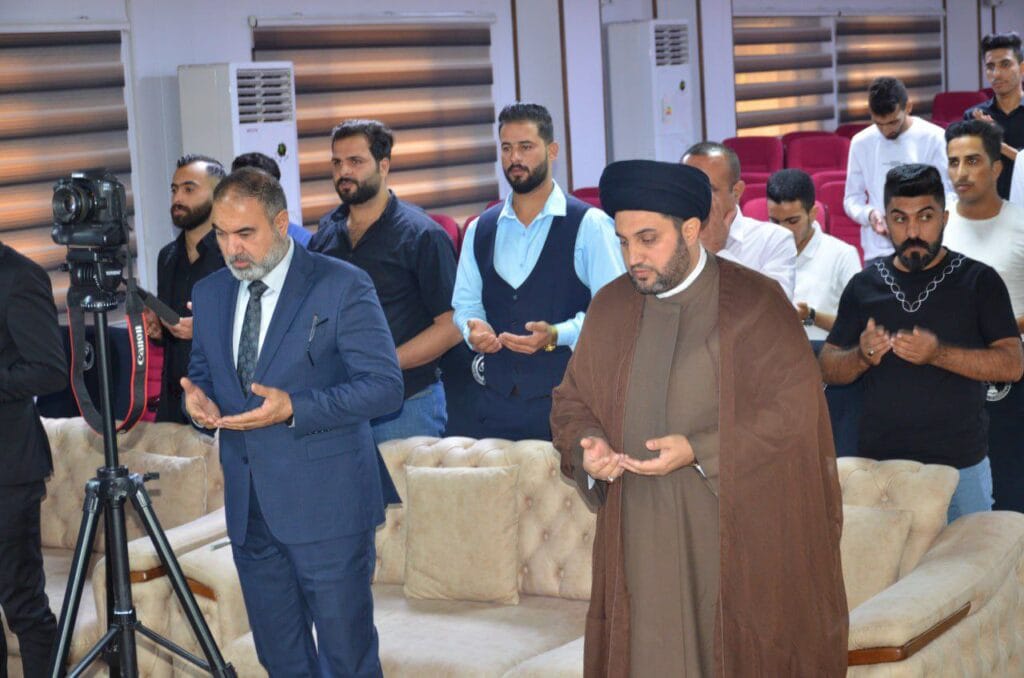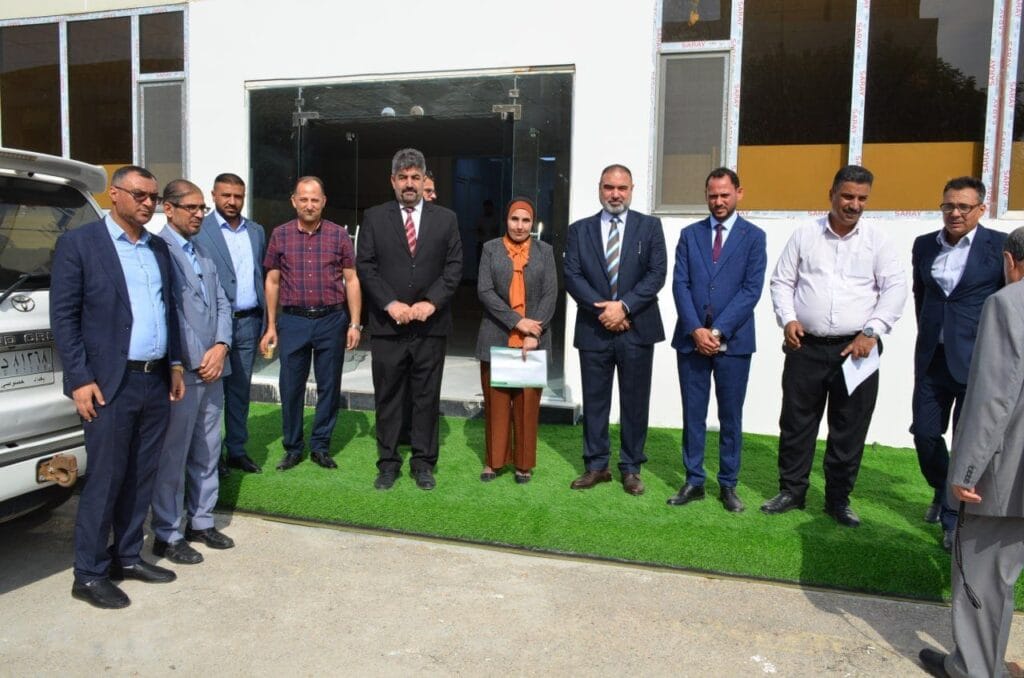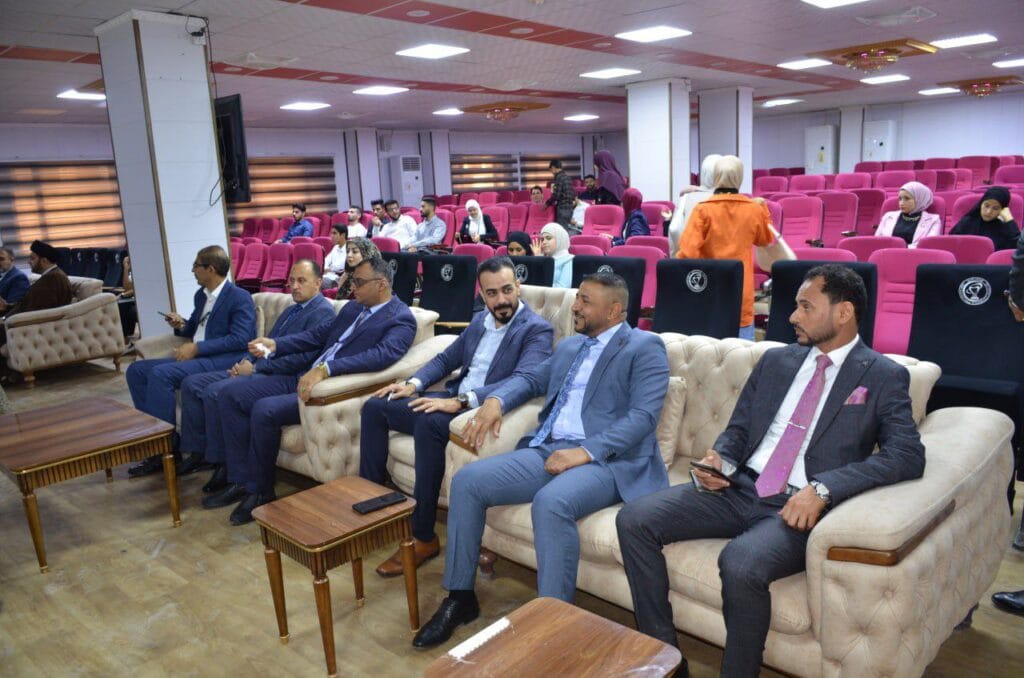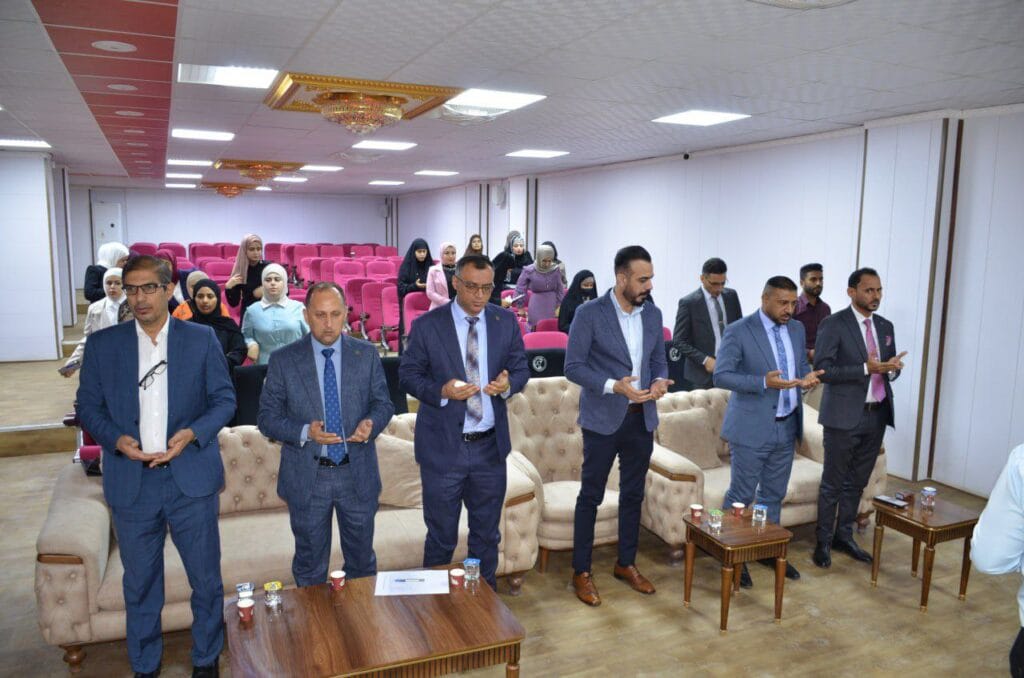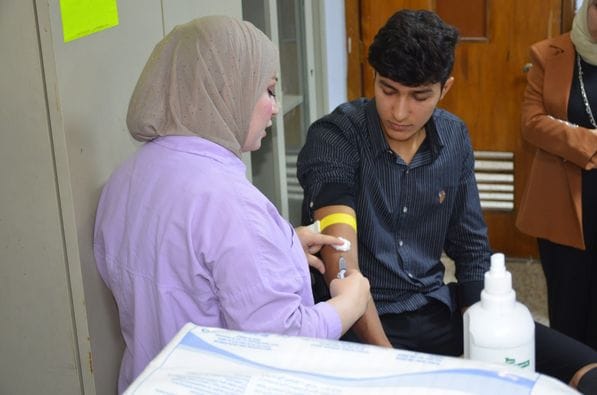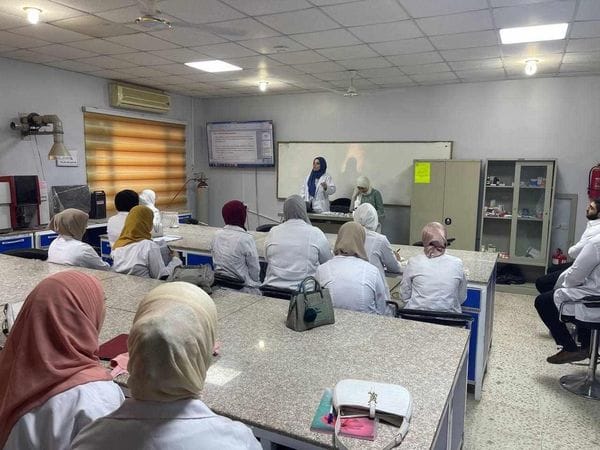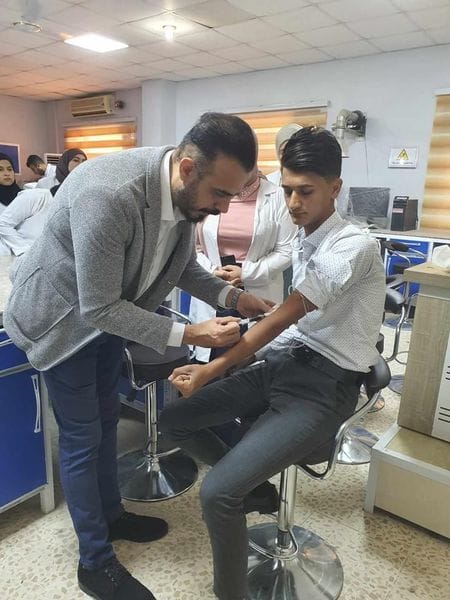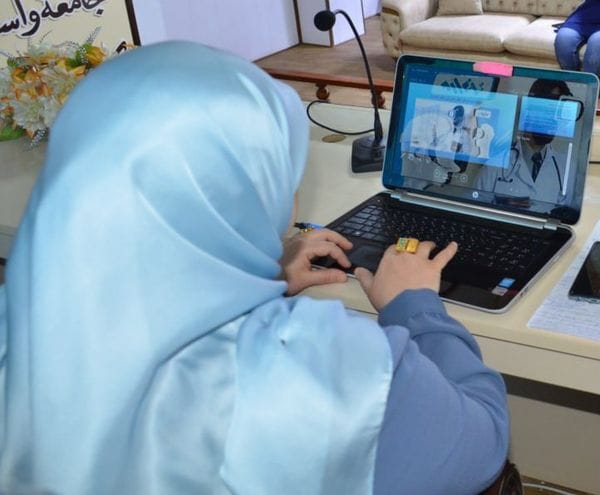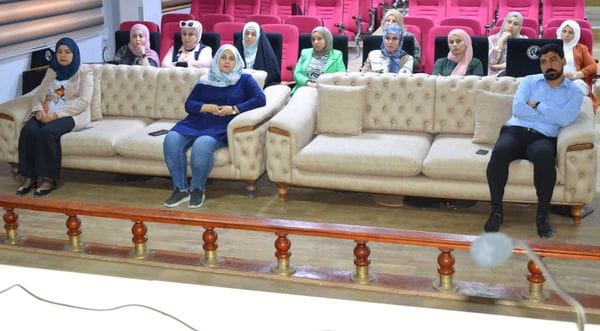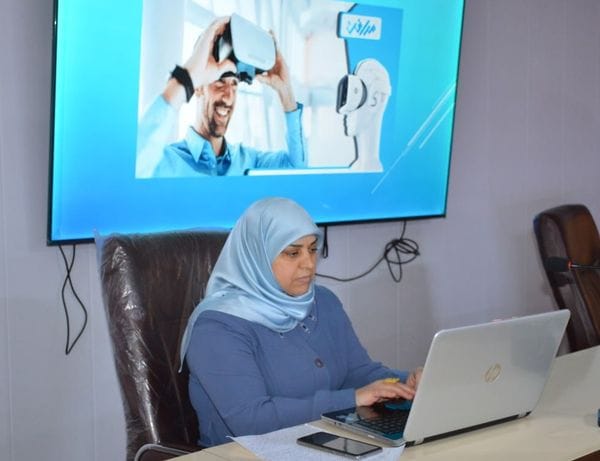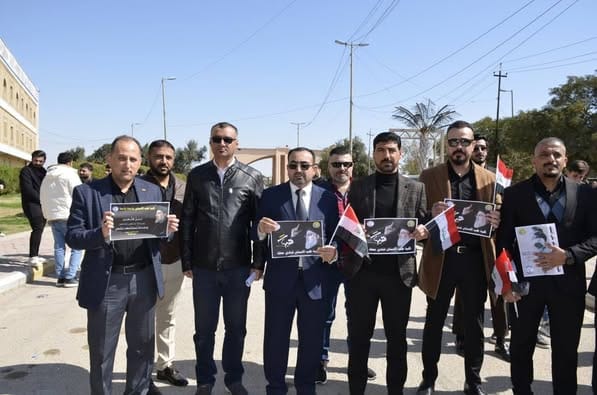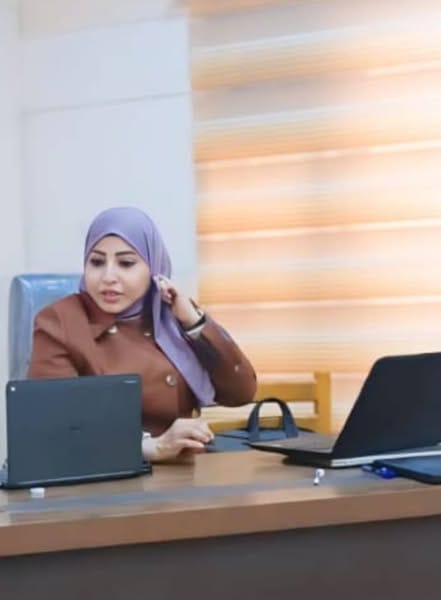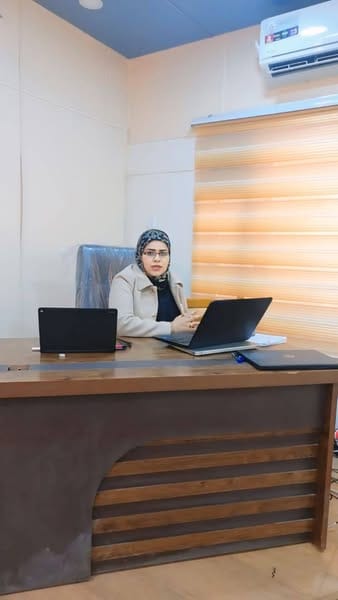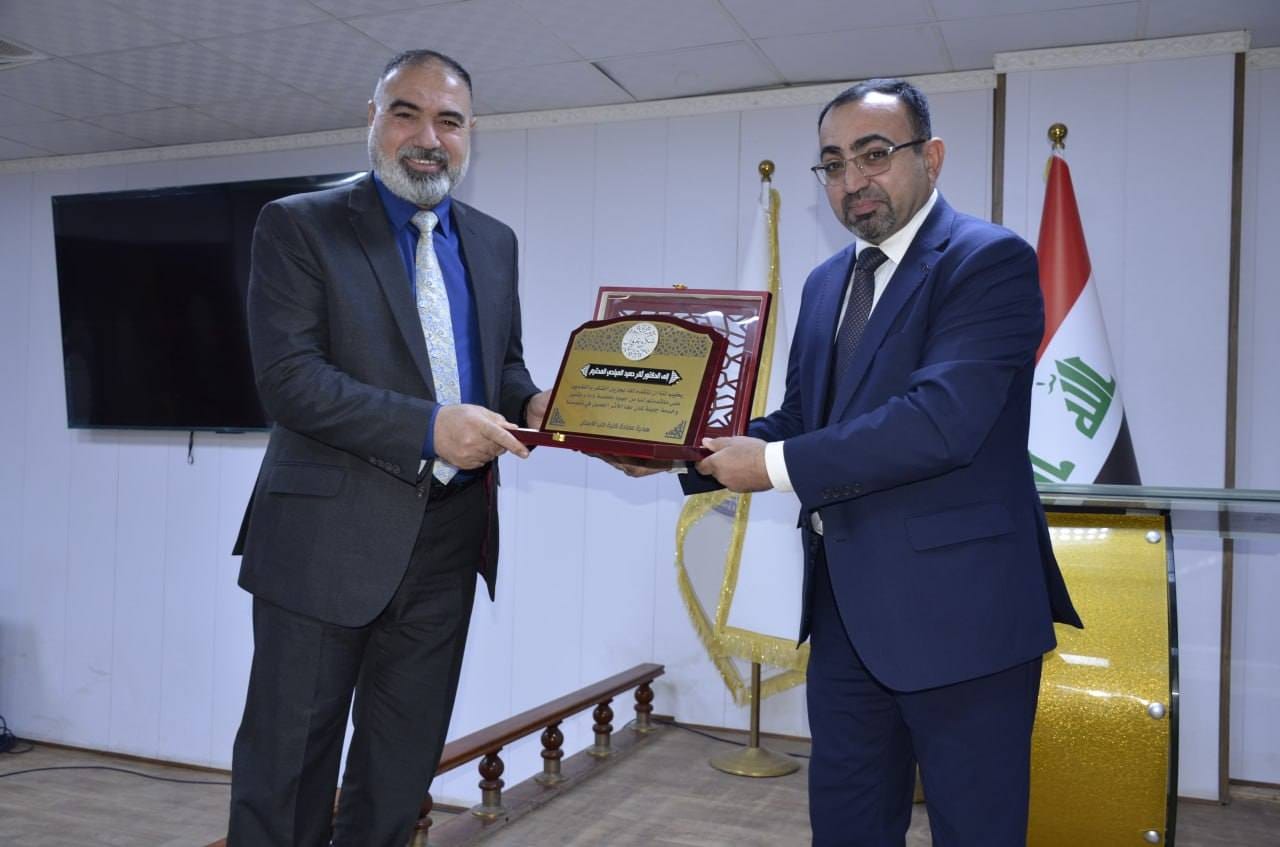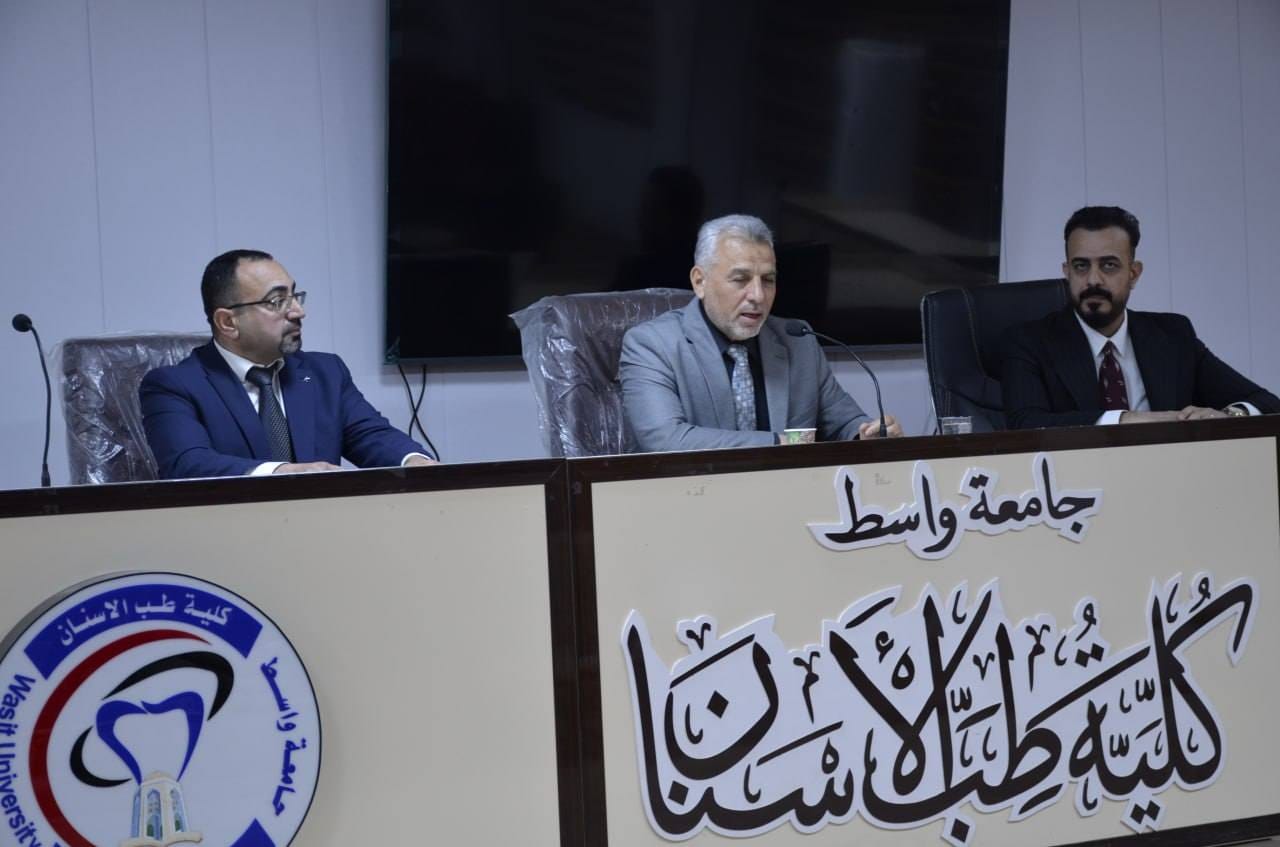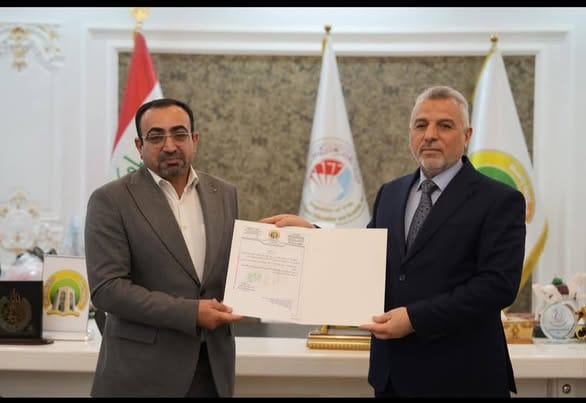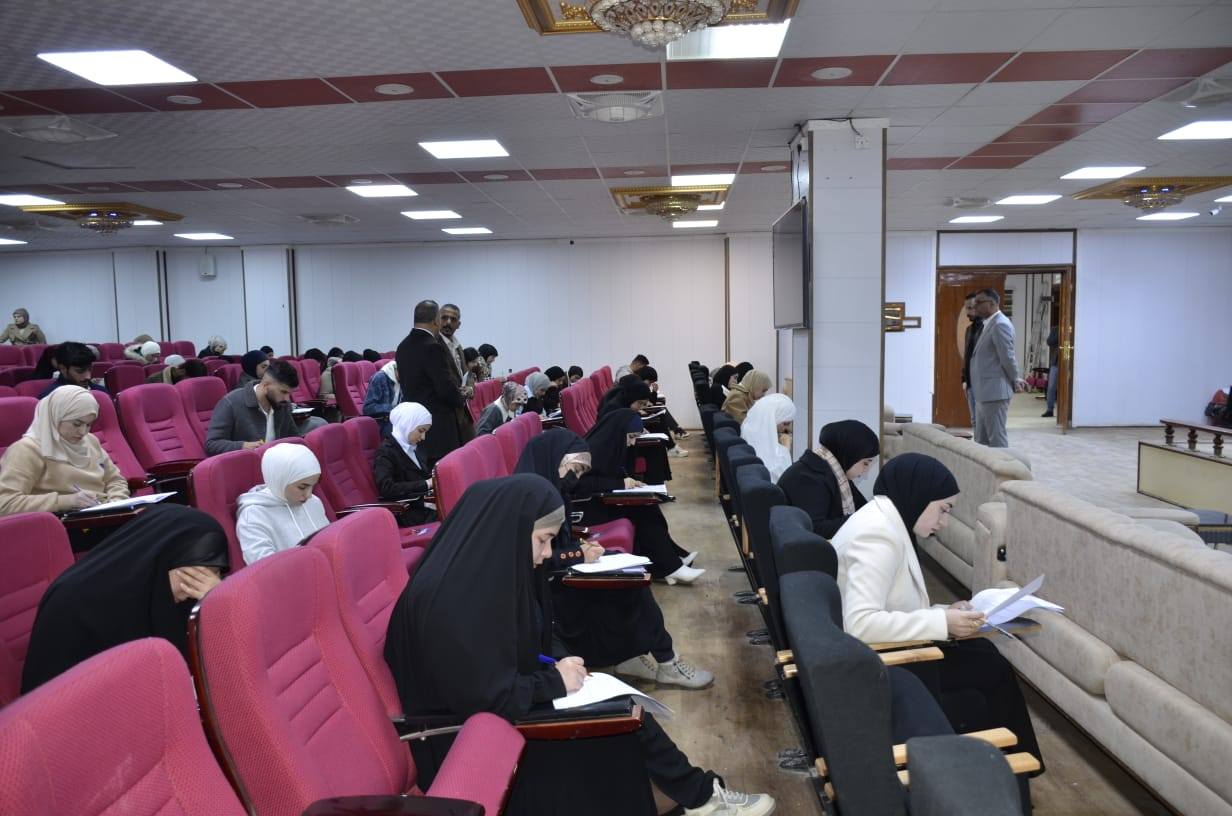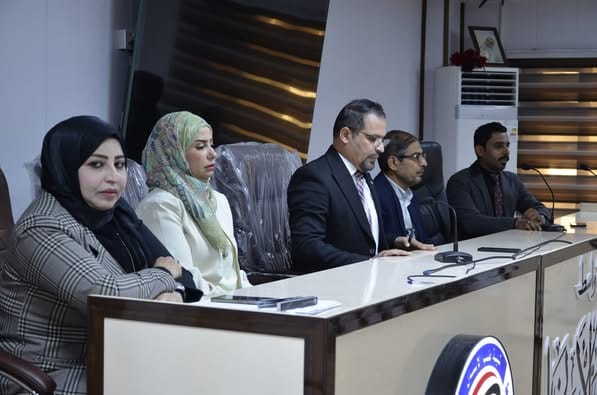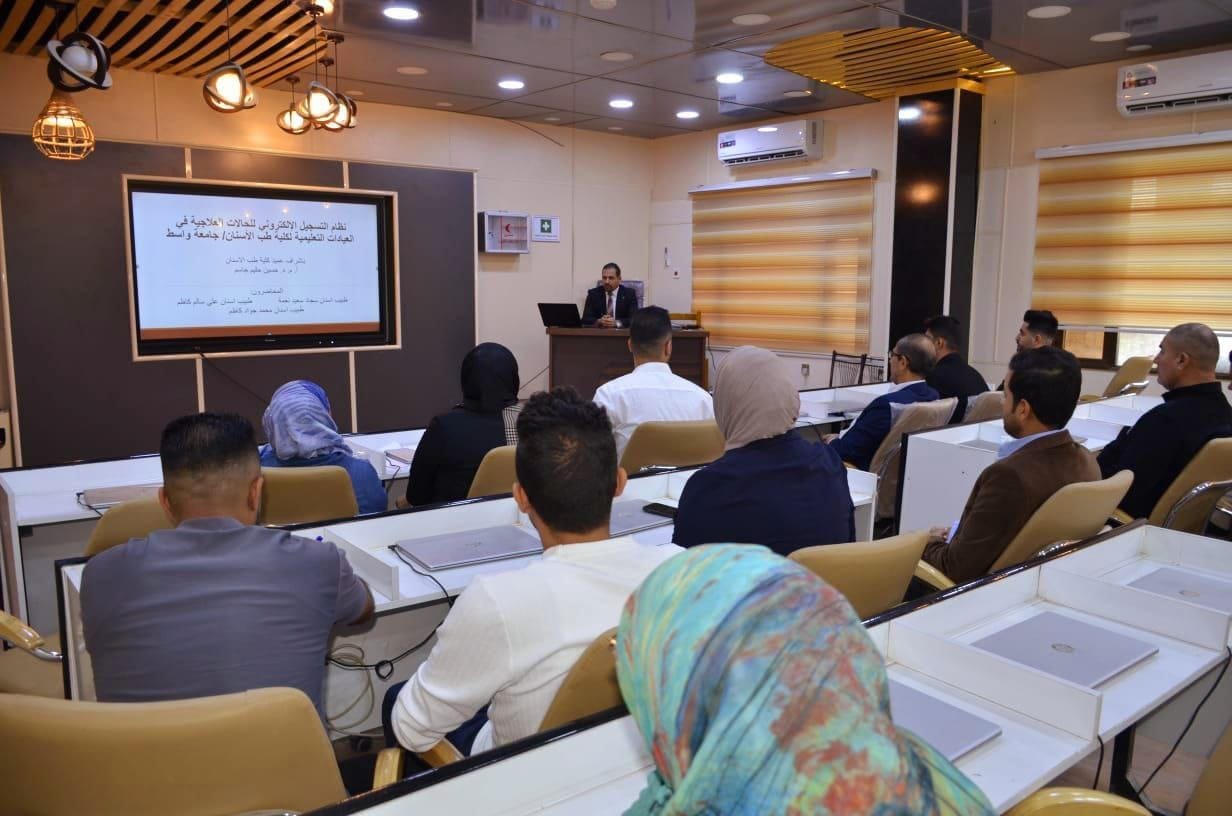workshops & Seminars 2023/2024
The College of Dentistry holds a scientific Seminar on thalassemia and its relationship to teeth
The Seminar , which was attended by M. Zainab Abdel Hassan Hussein and M. Nabaa Saeed Anaid, discussed the definition of thalassemia, treatment methods, types of the disease, the patient’s oral problems, and treating them with the latest correct methods to monitor them and protect the teeth from the transmission of diseases. The Seminar included an introductory overview of the disease and the latest international and local statistics on the disease, as well as the different types of the disease with their symptoms, signs, and methods of diagnosis.
A workshop on the relationship of mental health to achievement motivation among educational clinic employees
The Psychological Counseling and Educational Guidance Unit at the College of Dentistry at Wasit University held a workshop entitled ((Mental health and its relationship to achievement motivation among employees of educational clinics at the College of Dentistry)).
The workshop, which was attended by Mr. Ali Jabbar Yassin, head of the Psychological Counseling and Educational Guidance Unit, and Sari Nidal Rahim, head of educational clinics at the College of Dentistry, aimed to build the strategic direction of the mental health promotion program.
The workshop began with a detailed explanation of the concept of mental health, the characteristics of a mentally healthy personality, the factors affecting it, and its relationship to achievement motivation, which seeks to determine priorities for work to implement it according to clear legislation and methodologies and with a high degree of proficiency. In order to reach integrated work outcomes in academic institutions.
A cultural Seminar entitled (Youth and Future Aspirations)
The College of Dentistry at Wasit University held a cultural Seminar entitled (The importance of cultural identity in the survival and development of peoples and the danger of their disappearance).
The Seminar aimed to benefit from the creative efforts of young people and the extent of intellectuals’ belief in the movement and growth of their society according to global concepts based on dismantling the structures of inherited cultural concepts that isolate the movement and growth of society, which set sacred things in mind and reject development.
The Seminar , which was lectured by Dr. Jassam Muhammad Al-Saeedi, a researcher and author in psychology and sociology, and director of the Preventive Media Center at the Holy Abbasid Shrine, included two axes: the first was the importance of cultural identity, and the second was the components of cultural identity.
A training course on the types of drugs and their effects on society
The College of Dentistry at Wasit University organized a training course on drugs, their types, causes, effects on the individual and society, and methods of prevention.
The course presented by the lecturer (Mr. Dr. Amal Dasher Hussein) included an introduction to the types of drugs, their classifications, the reasons for their abuse, their effects on the health of the individual user and addict, and their negative effects at the health, economic, social and security levels on the individual and society. The course also discussed ways to prevent and protect society from this scourge, which is no less dangerous than terrorist crimes and which causes the dissipation of the energies of individuals and countries, and clarified medical methods in diagnosis and treatment stages.
Seminar on drugs
The College of Dentistry, in cooperation with the Office of the High Commissioner for Human Rights, held a Seminar entitled Drugs, causes and treatments, in the presence of a number of college professors and employees.
The Seminar , which was lectured by Mr. Ali Khudair Nahi, Assistant Director of the Office of the Commission, addressed the definition of the concept of human rights, as well as the definition of the High Commission for Human Rights and its method of work in accordance with its amended Law No. 53 of 2008.
The Seminar explained the dangers of drugs, the causes of addiction, the legal consequences that apply to drug dealers and drug users, and the international legislation and agreements that stipulate combating them.
A course entitled The Synergy of Cognitive Sciences in Detecting Crime
The College of Dentistry at Wasit University held a course entitled “The Synergy of Cognitive Sciences in Detecting Crime.”
The course aims to examine the various sciences and their mechanisms in conducting crime and detecting it using linguistic, psychological and medical methods.
The course covered two topics, the first of which dealt with forensic linguistics, and the second discussed the definition of forensic dentistry and its importance in detecting crimes.
A scientific course on the provisions of Iraqi law related to psychotropic substances and narcotics
The College of Dentistry held a scientific course entitled (Drug abuse among youth; a comprehensive overview of the Iraqi law regarding psychotropic substances and drugs and their health impact on humans) in cooperation with the College of Law.
The workshop included a lecture by Professor Dr. Mustafa Rashid Al-Kalabi, Head of the Public Law Branch, and Assistant Professor Dr. Sarhan Rashid Al-Zayadi, teaching assistant in the specialty of drugs and poisons at the College of Dentistry, and continued for three days.
A detailed explanation was provided of all paragraphs of the Iraqi law regarding drug abuse, as well as their various types and effects on human health.
A Seminar on the causes of the spread of obesity, prevention and treatment
The College of Dentistry at Wasit University organized a scientific lecture on (obesity, its spread, causes, prevention and treatment) with the participation of the scientific assistant, Prof. Alwan Al-Kashawi and a number of college teachers in Al-Makhzoumi Hall.
The Seminar’s topic and concepts focused on the spread of obesity and its causes, and how to take preventive measures and treatment against it.
A research study was discussed on the prevalence rates of obesity in the population and its various causes, age, hormonal, medication intake, etc., and methods of prevention and treatment were mentioned.
This lecture came within the College of Dentistry’s annual plan to hold seminars and conferences with the aim of progress and keeping pace with educational development
A workshop on scientific promotions in the College of Dentistry
Under the supervision of the Dean of the College, Assistant Professor Dr. Thaer Hamid Al-Mayahi, and in coordination with the Central Scientific Promotions Committee at the University Presidency, the College of Dentistry held a workshop entitled (Scientific Promotions in the Ministry of Higher Education and Scientific Research No. 167 of 2017) presented by the Chairman of the Central Scientific Promotions Committee, Professor Dr. Riyad Jabbar Mansour. .
The workshop included the approved mechanisms for the purposes of scientific promotion and how to fill out the forms attached to the instructions. It also explained the preparation of the research required for promotion for each academic title, as well as explaining how to publish in peer-reviewed and recognized journals and clarifying the most important scientific activities required of a faculty member for the purposes of promotion.
The workshop reviewed the gradual process of submitting the treatment, starting from the scientific department through the scientific committee.
A cultural Seminar to support the Palestinian cause
The College of Dentistry, in cooperation with the Smile Makers student team, held a cultural Seminar to support the Palestinian cause entitled “The Palestinian Cause is an Islamic and Humanitarian Position,” in the presence of Mr. Jaafar Al-Gharabi, in the presence of the Dean of the College, Prof. Thaer Hamid Al-Mayahi, and the scientific assistants, Prof. Prof. Alwan Al-Kashawi and the Administrator A. Prof. Wissam Al-Mayahi and the teaching staff, as well as the college students.
The Dean of the College said that this Seminar comes based on humanitarian and Islamic principles and the directives of the religious authority to clarify the position towards the Palestinian people who face the terrible and brutal Zionist attacks that targeted civilian residential areas as well as health centers in the Gaza Strip under the silent and Zionist governments.
During the Seminar , Al-Gharabi touched on several topics, including the humanitarian and Islamic stance on the issue, as well as the soft war practiced by Western countries in order to weaken, disintegrate, control peoples, and impose colonial hegemony on individuals and societies by falsifying facts and events and directing the media according to what they see as serving their Zionist interests.
At the conclusion of the Seminar, Al-Mayahi said, “We praise these activities held by this volunteer team in our college, which convey the cultural, scientific, and humanitarian image of the university student, influence the communities corresponding to him, and sharpen the resolve and responsibility in order to unify the social ranks and the humanitarian stance toward Arab issues.”
A training course on teaching blood drawing
The College of Dentistry at Wasit University held a training course on how to draw blood, with the participation of a large number of college students.
The course included providing theoretical and practical lectures with the aim of introducing students to the components of blood and the types of samples that can be obtained from humans, as well as training on drawing blood, how to deal with the patient before drawing, and how to deal with the sample after obtaining it.
A Seminar on virtual reality technology (VR) in the field of medicine
The College of Dentistry held a scientific Seminar entitled Uses of Virtual Reality (VR) technology in the field of medicine, attended by Dr. Rawaa Ismail Farhan and Dr. Baraa Ismail Farhan, teaching at the College of Education for Pure Sciences.
The course aimed to address the problems facing organizations with artificial intelligence, while emphasizing the role of the human element in building the database for this.
The Seminar recommended preparing training programs for owners of hospitals or medical centers, so that they can, through virtual reality, identify all doctors and conduct remote medical training programs in order to develop the capabilities of the medical team.

